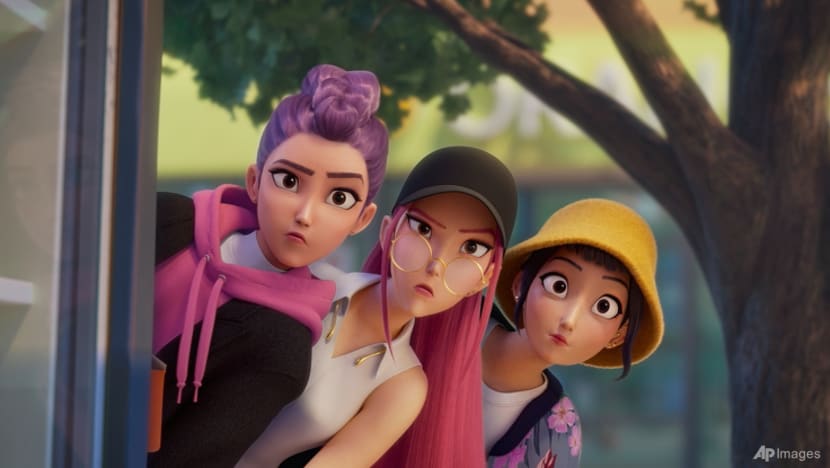Commentary: The K in K-pop is already silent. And that’s okay
As K-content like KPop Demon Hunters grows, it should shake off any concerns about abandoning its roots, says Juliana Liu for Bloomberg Opinion.

This image released by Netflix shows characters, from left, Rumi, Mira, and Zoey in a scene from KPop Demon Hunters. (Netflix via AP)

This audio is generated by an AI tool.
HONG KONG: Anyone with children endlessly rewatching KPop Demon Hunters might assume that South Korean content has already taken over the world. In fact, K-pop has enormous room to grow in a global music industry expected to be worth just under US$200 billion in 10 years.
As it does, it should shake off any concerns about abandoning its roots. Like hip hop, there’s no reason why the genre can’t have a similarly inclusive trajectory while remaining true to its core.
A co-production partnership between Warner Bros Discovery and CJ ENM announced earlier this month is just the latest example of the strong international demand for Korean movies and TV shows. According to Netflix, an early mover which arrived in 2016, over 80 per cent of subscribers watch K-content.
It’s part of a larger cultural movement of exports including music, beauty, food, and fashion that was worth more than US$31 billion last year. For comparison, that’s just under half the value of all automobiles sold overseas.
As a longtime observer of Hallyu, or Korean wave, it has been fascinating to see it evolve from the 1990s, when shows were made almost entirely for local consumption with limited exports to Japan and Taiwan. Then came the 2000s when the musician Rain and TV series Jewel In The Palace won fans across Asia.
Things really started to take off in the 2010s. Films and TV shows were marked by splashier, more expensive productions often taking place overseas. Space travel romance My Love From Another Star and military drama Descendants Of The Sun were the smash-hit exemplars of this time. The programmes were so popular there were regular reports of fans suffering health problems after overindulging. BTS and Blackpink debuted in this era; Parasite won the Oscar for Best Film.
MADE BEYOND KOREA
Since the beginning of the current decade, we’ve been firmly in a “made beyond Korea” moment, according to Bernie Cho, president of DFSB Kollective, a Seoul-based artist and label services agency. The content is anchored in the culture, but the hands that make it may not belong to someone who is ethnically Korean or has a Republic of Korea passport.
Blackpink’s Lisa, winner of numerous industry firsts and Labubu’s fairy godmother, is the most famous example. Born in Thailand, she moved to Seoul in 2011 as a teenager after being scouted by YG Entertainment, one of the Big Four record labels. Bandmate Jennie was born in Seoul and lived in New Zealand. Rose was born a Kiwi and raised in Australia. Only Jisoo has lived in South Korea all her life.
Because growth is limited at home due to a shrinking population, it’s imperative for the K-culture industry to pivot abroad. Instead of fighting over scraps in the way so many Chinese industrial companies are doing, it makes sense to look beyond a 50-million fan base at home to the 8 billion potential fans outside.
K-POP ISN’T BEING COLONISED
In terms of music consumption, K-pop is already on that path. Audience data shows that there are now far more fans outside South Korea than at home.
According to Chartmetric, the largest group of fans as measured by followers on Instagram and YouTube came from Indonesia, followed by the United States and the Philippines. South Korea came in only fourth, just ahead of Thailand and Brazil.
For decades, there were just three countries – the US, UK and Sweden – consistently exporting more music than they imported. South Korea has emerged as the fourth, according to Pivotal Economics. On YouTube, for every Korean subscribed to an overseas musician, there were 17 foreign fans watching a homegrown artist.
This trend is reflected in the content. A Bloomberg News analysis of song lyrics last year showed that for the first time, almost half of K-pop singles released had English lyrics.
The idea that the genre should drop the “K” in order to conquer the overseas market has been repeatedly popularised by Bang Si-Hyuk, founder of Hybe, the man behind BTS and the world’s fourth-largest record label.
The concept has upset many fans, but he’s not talking about erasing what’s unique about the K-pop sound or ditching a business model where hopefuls undergo long periods of training before starting their careers. It’s a tonal shift to acknowledge the genre’s inclusiveness.
Hybe and rival record labels are exporting that time-tested, quintessentially Korean system. K-pop isn’t being colonised. It’s the other way around.
When first watching KPop Demon Hunters, I was confused. Here was a Westernised story told in English, set in Seoul, and starring animated Korean characters. I wanted to put it in a box. Is it Kung Fu Panda or Ne Zha 2?
Well, like K-pop itself, it’s a hybrid – a blend of a North American perspective underpinned by a Korean soul. And as the WBD-CJ ENM deal suggests, the way of the future is with people of different backgrounds involved in production. Being able to succeed in so many countries isn’t a problem, it’s a privilege.

















